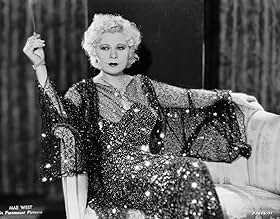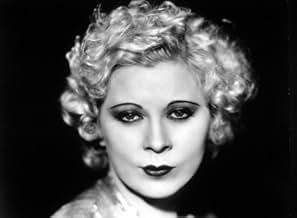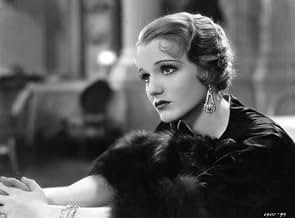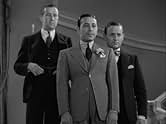IMDb RATING
6.7/10
1.3K
YOUR RATING
A successful ex-boxer opens a high-class speakeasy in what once was the childhood home of a formerly rich society girl.A successful ex-boxer opens a high-class speakeasy in what once was the childhood home of a formerly rich society girl.A successful ex-boxer opens a high-class speakeasy in what once was the childhood home of a formerly rich society girl.
- Awards
- 2 wins total
George Templeton
- Patsy
- (as Dink Templeton)
Jay Eaton
- Nightclub Patron
- (uncredited)
Bill Elliott
- Escort
- (uncredited)
Patricia Farley
- Hatcheck Girl
- (uncredited)
Dick Gordon
- Nightclub Patron
- (uncredited)
Theresa Harris
- Ladies' Room Attendant
- (uncredited)
Featured reviews
Night After Night finds George Raft as a former boxer now owner of a swank speakeasy who is looking to move up in class. A part Raft could really identify with considering his own humble circumstances.
In addition Raft is juggling three women, society girl Constance Cummings, former flapper Wynne Gibson, and the one and only Mae West.
Without Mae in this film, Night After Night would be just a routine film with nothing terribly special. But because Mae made her screen debut, the film has come down as a legend.
West is only on the screen for about 15 minutes of the film, but it's 15 unforgettable minutes. Raft is trying to acquire some culture and polish and hires Alison Skipworth to educate him in the finer arts. He brings her along to dinner with Constance Cummings to impress Cummings and Mae crashes the party.
When Paramount hired West they apparently did not know what to do with her. The part she has here as originally written is a supporting role. Remember she was a star on Broadway and wrote a lot of her own material. Mae persuaded the powers of Paramount to let her write her own lines and she wound up stealing the film.
As this was pre-Code the budding relationship of Mae to Skipworth shows more than a hint of lesbianism. As it was Mae West was quite the gay community icon, still is.
Without her, Night After Night is a routine, even substandard melodrama, with Mae it's a classic.
In addition Raft is juggling three women, society girl Constance Cummings, former flapper Wynne Gibson, and the one and only Mae West.
Without Mae in this film, Night After Night would be just a routine film with nothing terribly special. But because Mae made her screen debut, the film has come down as a legend.
West is only on the screen for about 15 minutes of the film, but it's 15 unforgettable minutes. Raft is trying to acquire some culture and polish and hires Alison Skipworth to educate him in the finer arts. He brings her along to dinner with Constance Cummings to impress Cummings and Mae crashes the party.
When Paramount hired West they apparently did not know what to do with her. The part she has here as originally written is a supporting role. Remember she was a star on Broadway and wrote a lot of her own material. Mae persuaded the powers of Paramount to let her write her own lines and she wound up stealing the film.
As this was pre-Code the budding relationship of Mae to Skipworth shows more than a hint of lesbianism. As it was Mae West was quite the gay community icon, still is.
Without her, Night After Night is a routine, even substandard melodrama, with Mae it's a classic.
I was expecting a lousy film whose only value was as the debut film of Mae West - I mean Leonard calls it a "crashing bore"! But what I got was a delightful film, excellently acted by all, with a profound theme and great dialogue. It is a film about dissatisfaction - all the characters are unhappy with their lot and desperately grasping for change. George Raft, the slick gangster, wants an education and true love. Constance Cummings also wants true love, although she thinks she wants security. And Alison Skipworth wants the wild life instead of school teacher drudgery. Only Mae West seems happy with her place as a man-devouring cosmetician.
This film is not a comedy - although it has many hilarious scenes (wait until you see West and Skipworth in bed together!). It is a frank and insightful drama, very risque and dangerously sexual. George Raft is unusually sensitive, Constance Cummings outstanding and Alison Skipworth dazzling. The supporting cast is also fine - led by the incomparable Mae West. A rare treat from the early 1930's.
This film is not a comedy - although it has many hilarious scenes (wait until you see West and Skipworth in bed together!). It is a frank and insightful drama, very risque and dangerously sexual. George Raft is unusually sensitive, Constance Cummings outstanding and Alison Skipworth dazzling. The supporting cast is also fine - led by the incomparable Mae West. A rare treat from the early 1930's.
While I enjoyed “The Mae West Glamour Collection” more than I expected to, I decided to leave her debut film for last, knowing that it wouldn’t be a typical vehicle of hers since she wasn’t the lead; I also figured it would be, as Leonard Maltin bluntly puts it, “a crashing bore”. However, I was quite surprised by how engaging and entertaining it all was – if, by no means, a classic. The film, in fact, is an agreeable blend of two styles that were en vogue during the early Talkie era: the sophisticated comedy-drama and the gangster picture, apart from also being adapted from a stage play (as were a good many movies back then).
The lead proper of the film is George Raft, who had just shot to stardom following his memorable supporting role in Howard Hawks’ SCARFACE (1932); of the stars associated with the heyday of the Gangster movie, Raft always seemed to me the most limited in range – but he does well enough here, flanked by his butler-cum-henchman Roscoe Karns (a mainstay of 1930s comedies). Watching this flick 75 years after it was made, I couldn’t help but wonder about all the gay subtexts today’s audiences would erroneously interpret in their “relationship” here!
Raft is the owner of a speakeasy who wants to improve himself for the sake of ‘mysterious’ socialite Constance Cummings (who, as it turns out, used to own the building) – despite being involved with at least two other women of lower standards (Wynne Gibson and Mae West); to do so, he engages the services of elderly teacher Alison Skipworth. Cummings (who’s adorable throughout – as had also been that same year in Harold Lloyd’s MOVIE CRAZY) incurs the wrath of jealous Gibson, who confronts her and Raft with a gun – a situation which Cummings finds exciting, drawing her nearer to Raft than she intended and deluding him into thinking that she has affections for him; of course, when he finds out that she had counted on marrying wealthy Louis Calhern all along, he gives up his cultured airs and withdraws his promise of selling the club to a rival! But during the ensuing mob fracas at Raft’s joint, Cummings realizes that she loves him after all...
As I said, I found the film to be fairly interesting for several reasons: Mae West’s own role isn’t central to the main plot (in fact, she not only appears exactly at the midway point of the film but shares more scenes – and even a bed! – with Skipworth than she does with Raft himself), but her presence certainly boosts proceedings; already, she’s got her way with dialogue (and not just the famous “Goodness had nothing to do with it, dearie” line) but it also feels like she’s playing a real character in this case rather than just being her in-your-face ‘naughty’ self…and West’s figure is perhaps at its sexiest here with as racy a costume as Pre-Code Hollywood liberalism ever got!
It’s amusing to watch the accompanying trailer today – hyping Raft’s rising star power (even mentioning a couple of earlier films apart from SCARFACE, both of which are now completely forgotten), and how this was achieved largely through the clamor of the movie-going public, when NIGHT AFTER NIGHT’s greatest (single?) claim to fame nowadays is for having introduced Mae West to the silver screen!
Finally, I wonder whether Universal is planning to release a second set of her films (they own four of her remaining titles); THE HEAT’S ON (1943) is a Columbia picture but it has already been released by Universal on R2 as part of a 6-Disc Mae West Set which also includes the bulk of the as-yet-unavailable titles on R1 (plus a couple of overlaps)!
The lead proper of the film is George Raft, who had just shot to stardom following his memorable supporting role in Howard Hawks’ SCARFACE (1932); of the stars associated with the heyday of the Gangster movie, Raft always seemed to me the most limited in range – but he does well enough here, flanked by his butler-cum-henchman Roscoe Karns (a mainstay of 1930s comedies). Watching this flick 75 years after it was made, I couldn’t help but wonder about all the gay subtexts today’s audiences would erroneously interpret in their “relationship” here!
Raft is the owner of a speakeasy who wants to improve himself for the sake of ‘mysterious’ socialite Constance Cummings (who, as it turns out, used to own the building) – despite being involved with at least two other women of lower standards (Wynne Gibson and Mae West); to do so, he engages the services of elderly teacher Alison Skipworth. Cummings (who’s adorable throughout – as had also been that same year in Harold Lloyd’s MOVIE CRAZY) incurs the wrath of jealous Gibson, who confronts her and Raft with a gun – a situation which Cummings finds exciting, drawing her nearer to Raft than she intended and deluding him into thinking that she has affections for him; of course, when he finds out that she had counted on marrying wealthy Louis Calhern all along, he gives up his cultured airs and withdraws his promise of selling the club to a rival! But during the ensuing mob fracas at Raft’s joint, Cummings realizes that she loves him after all...
As I said, I found the film to be fairly interesting for several reasons: Mae West’s own role isn’t central to the main plot (in fact, she not only appears exactly at the midway point of the film but shares more scenes – and even a bed! – with Skipworth than she does with Raft himself), but her presence certainly boosts proceedings; already, she’s got her way with dialogue (and not just the famous “Goodness had nothing to do with it, dearie” line) but it also feels like she’s playing a real character in this case rather than just being her in-your-face ‘naughty’ self…and West’s figure is perhaps at its sexiest here with as racy a costume as Pre-Code Hollywood liberalism ever got!
It’s amusing to watch the accompanying trailer today – hyping Raft’s rising star power (even mentioning a couple of earlier films apart from SCARFACE, both of which are now completely forgotten), and how this was achieved largely through the clamor of the movie-going public, when NIGHT AFTER NIGHT’s greatest (single?) claim to fame nowadays is for having introduced Mae West to the silver screen!
Finally, I wonder whether Universal is planning to release a second set of her films (they own four of her remaining titles); THE HEAT’S ON (1943) is a Columbia picture but it has already been released by Universal on R2 as part of a 6-Disc Mae West Set which also includes the bulk of the as-yet-unavailable titles on R1 (plus a couple of overlaps)!
In particular this is a great showcase for George Raft in his first leading role and Mae West in her first film role. Raft plays Joe Anton, a bootlegger who buys a mansion at a foreclosure auction and turns it into a speakeasy. Anton wants what he thinks the Park Avenue crowd has now that he has the money - class. He employs Mabel Jellyman (Alison Skipworth) to tutor him properly in elocution and current events. But Anton has other troubles with his current life as a gangster besides not knowing what fork to use. Rival gangsters are demanding that he sell out to them or they will rub him out. He has two old girlfriends that keep showing up unannounced too - Maudie (Mae West) is easy going about things, but Iris (Wynne Gibson) is demanding to the point of being violent that their old relationship continue. Matters get really complicated when "a real lady" shows up alone night after night at Joe's speakeasy. She's not looking for a pickup, in fact she shuns advances of any kind. It turns out she's the destitute ex-resident of Joe's mansion who misses her old house and her old life.
If you're looking for a really clever tight script, that doesn't seem to be the purpose of this film. It's just one of Paramount's sophisticated pre-codes with lots of little scenes that make the whole thing worthwhile. The scene with a hung-over Alison Skipworth getting a job offer from Mae West with Skipworth trying to tactfully figure out exactly what business Mae is in is priceless - Skipworth can't help but notice that Maudie (Mae West) is covered in diamonds with no visible means of support. There's been lots of speculation about the nature of the relationship between Joe and his man Friday Leo (Roscoe Karnes) given the rather revealing bath scene the two men are in, but I think that was just an opportunity for a little precode male beefcake.
Highly recommended as one of a very few of the Paramount precodes actually on DVD.
If you're looking for a really clever tight script, that doesn't seem to be the purpose of this film. It's just one of Paramount's sophisticated pre-codes with lots of little scenes that make the whole thing worthwhile. The scene with a hung-over Alison Skipworth getting a job offer from Mae West with Skipworth trying to tactfully figure out exactly what business Mae is in is priceless - Skipworth can't help but notice that Maudie (Mae West) is covered in diamonds with no visible means of support. There's been lots of speculation about the nature of the relationship between Joe and his man Friday Leo (Roscoe Karnes) given the rather revealing bath scene the two men are in, but I think that was just an opportunity for a little precode male beefcake.
Highly recommended as one of a very few of the Paramount precodes actually on DVD.
I'm sorry, but I do not understand most of the reviews here taking so much time on Mae West (not my aunt). This was the first movie in which I was aware of Constance Cummings, and for me, she makes it. Mae West is an amusing diversion, a counterpoint to the core story, but it is not her movie. Constance Cummings is both gorgeous and icily, mysteriously seductive. In every one of her scenes. she fascinates and dominates.
Yes, it's fun to hear the first iteration of Mae's "goodness had nothing to do with it", and yes, the ending is simplistic and abrupt, but it was the Cummings character that kept me watching.
Yes, it's fun to hear the first iteration of Mae's "goodness had nothing to do with it", and yes, the ending is simplistic and abrupt, but it was the Cummings character that kept me watching.
Did you know
- GoofsA shadow of the boom microphone is visible to the upper left of the front door of the speakeasy when Maudie first arrives.
- Quotes
Hatcheck girl: Goodness, what beautiful diamonds!
Maudie: Goodness had nothing to do with it, dearie.
- ConnectionsFeatured in L'univers du rire (1982)
- SoundtracksEveryone Says I Love You
(uncredited)
Music by Bert Kalmar
Played at the speakeasy when Joe makes the rounds and first spots Jerry
Also played at the end
- How long is Night After Night?Powered by Alexa
Details
- Runtime
- 1h 13m(73 min)
- Color
- Aspect ratio
- 1.37 : 1
Contribute to this page
Suggest an edit or add missing content

























